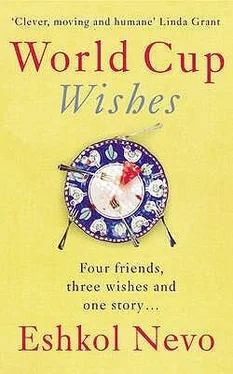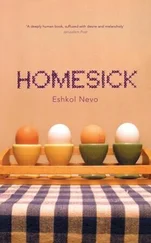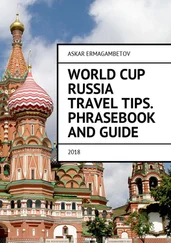The fears grew when Sadat — without shaking hands with Amichai or any of the other family members, as is customary — sat down on one of the chairs, stared at his shoes and didn’t say a word.
Excuse me, who … who are you, sir, if I may ask? Ya’ara dared to be the first to speak. Her voice shook slightly.
I … I’m sorry … I … This is the shiva for Ilana, isn’t it? I … at the checkpoint … I heard from her friends what happened … And I said … I have to go … to talk … so they gave me the address …
What’s your name? Churchill asked. His tone was aggressive, as if he were questioning a witness.
I’m sorry … I didn’t say … My name is Sadat …
And your surname?
What? Ah … Sadat Khuria.
And … what’s your connection to Ilana, Sadat? Ya’ara asked quickly, before Churchill could continue with that tone of his (and she put a restraining hand on his thigh as she spoke).
I … I have no connection — Sadat said, shifting his eyes from Churchill to her in relief — I mean … there is a connection … we are not friends or anything … no … just once … Ilana, she helped me, she helped me very much.
Everyone in the room moved their black chairs closer to hear better. The ones working in the kitchen left their work for a minute and came into the living room. Even Amichai leaned forward.
I should have … Sadat began to speak and stopped, choosing his words again. I … I have cancer. And I need to go for medical treatment … to a hospital in Israel. They have the medicines only in Israel. And the army lets me out for a month, two months. And then one day comes the checkpoint, and a soldier doesn’t let me out. Why? My cousin from Gaza was mixed up in hostile actions. That is what they call them. And the soldier says because of that I have no permit to go out. I go to the officer. The officer says no too. And it was like that for three weeks, every day I go there and they don’t let me out. Sometimes I sleep at night in a workers’ van. Sometimes I sleep on the ground, near the checkpoint. To be the first in line. But they don’t let me out. And, meanwhile, cancer. Till Ilana … Ilana is standing there. She sees me … gives me a bottle of water … to drink … asks what happened … I tell her … and she says, I will take care of it … and she does.
How? Churchill asked. How did she take care of it? And his tone was already less interrogating and more interested.
I don’t know … One day I come to the checkpoint and they tell me it is all arranged. And that she takes me to the hospital now.
What she? Ilana took you to the hospital?
Yes … she … what she tells me … that she checked in court and they are not allowed to do that … and besides … she tells them … she is responsible to take me and bring me back to the checkpoint the same day.
Did you know about this, Amichai? Churchill asked. Amichai didn’t answer.
Sadat looked at Amichai with interest. You are Ami … I remember she talked on the phone to you … when we were driving … you … ya’ani … you are her husband?
Amichai lowered his head in confirmation.
You … you had a very special wife … because of her I don’t go to the hospital today … I come here … so you will know … that she was for me … not just for me … for many … like an angel.
Amichai didn’t speak. His eyes glistened with tears about to fall.
Then he stood up from his chair, walked towards Sadat and threw his arms around him. He let out a huge, chilling sob, and he continued to tremble in his arms, soundlessly, for a long minute.
The entire time I had the feeling that it wasn’t real, Ya’ara said later. That Arab … the way he suddenly showed up. It was like a scene from a movie.
There’s something about a shiva that’s … I said. And I couldn’t find the word.
Yes, she said.
*
I gave her a lift back to Tel Aviv. She’d come to Haifa with Churchill, but half an hour later, he was called back to the office because one of the prosecution’s main witnesses had decided to retract his testimony.
She’d asked me, in front of everyone, if she could go back with me, and I felt uncomfortable refusing in front of everyone. So at five in the afternoon, we left the mourners’ house and she stopped for a minute at the entrance to the building to change her normal glasses for her prescription sunglasses, and I stopped with her, well practised in that change, and she smiled at me, and we both knew why. The muscles of my mouth stayed tensed till we reached the car, and I opened the door for her with the key, like a gentleman, even though I could have just pressed the remote. Then, inside, I said excuse me when I leaned over to release the security lock, and even though she moved her leg, my hand brushed against her thigh. So I said excuse me again.
As we drove slowly down Freud, I looked at the sea. From the Carmel, the sea looks so enormous that it reminds you that land accounts for only one-quarter of the planet. The sun hadn’t set yet, but it was close. There wasn’t a cloud on the horizon. I thought about the fact that actually, I hadn’t been alone in the same space with Ya’ara for two years, and that even though she’d changed her perfume, under it her smell was the same. A clean smell.
We didn’t speak until the palm trees at Atlit.
Then she talked about the Arab. And how terrible it was, what was happening. And how, for years, there’d been a feeling that there was hope for change, and now we were back in the same vicious circle. And worst of all, no one cared any more.
For a quick second, I thought of that horrible 1990 World Cup, in the territories, and I said, it’s not that no one cares, it’s just that we don’t know how to deal with it, so we’d rather forget about it.
And she said, it seeps inside you. We ignore it, but it seeps inside and comes out in other things.
And I thought about an article I was translating then that dealt with the years-long denial by Soviet scientists of the existence of chromosomes. The writer of the article claimed that Soviet scientists had disregarded chromosomes for decades because research into heredity didn’t fit the Stalinist line, which maintained that environment, not heredity, is solely responsible for human change. I thought about mentioning that article then, but I wasn’t sure exactly how to connect it to the conversation.
So I kept quiet.
And Ya’ara said, sometimes I don’t understand why we insist on staying in this damned place. Why we don’t move to a more normal country.
Because … our friends are here, the response came out automatically.
Yes … But when I hear about cases like Sadat’s … I ask myself … if friends are a good enough reason.
I don’t know, I said. Because I didn’t.
And Ya’ara said, it’s a good thing that there are people like Ilana who save our honour. And she also said, I feel like I missed her completely, that I didn’t know her at all. I don’t know, I always had the feeling she couldn’t stand me.
She really couldn’t stand you, I said.
And we laughed.
And we were silent.
And I felt that thing begin to swell up in my chest.
After the Zichron junction, she said, I forgot how much fun it is to drive with you. You’re so calm behind the wheel. When I drive with your friend, all my muscles cramp from the tension. He has this thing where …
He always has to brake at the last second, I said, finishing the sentence.
At the last hundredth of a second, she said with a smile.
He’s insanely busy now, isn’t he? I asked in an attempt to continue the complaining-about-Churchill line.
Yes, she said, shifting in her seat. It’s completely taken him over, that case.
Читать дальше












